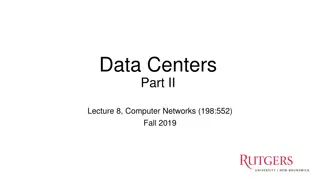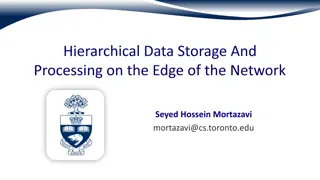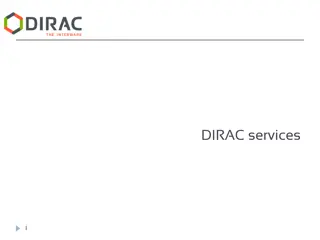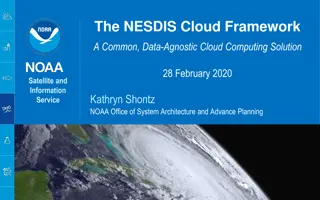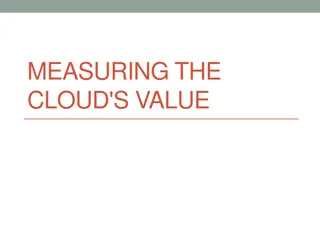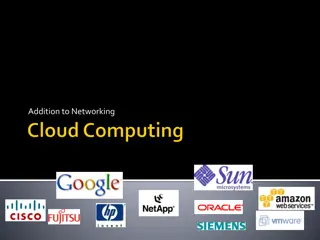The Dangers of Gossip in Cloud Computing
Gossip protocols in cloud computing can provide benefits like low costs and efficient information spread, but they also pose risks. An example is the Amazon S3 crash caused by gossip, leading to major disruptions. Understanding the implications of gossip in cloud systems is crucial for maintaining reliability and performance.
Download Presentation

Please find below an Image/Link to download the presentation.
The content on the website is provided AS IS for your information and personal use only. It may not be sold, licensed, or shared on other websites without obtaining consent from the author.If you encounter any issues during the download, it is possible that the publisher has removed the file from their server.
You are allowed to download the files provided on this website for personal or commercial use, subject to the condition that they are used lawfully. All files are the property of their respective owners.
The content on the website is provided AS IS for your information and personal use only. It may not be sold, licensed, or shared on other websites without obtaining consent from the author.
E N D
Presentation Transcript
CS5412 / LECTURE 13: THE DANGERS OF GOSSIP Lecture V Ken Birman Spring, 2022 CS5412 CLOUD COMPUTING, SPRING 2022 1
REMINDER: GOSSIP When run at a steady rate, these protocols consume a fixed amount of background overhead. There can be load surges if participants are Byzantine, or if they use techniques like the Bimodal Multicast idea In normal use, costs are quite low, like on average, one message sent and one received per process, per second . Message sizes are generally small. Moreover, information spreads in time r * O(log N), where r is the gossip rate. For many purposes this actually very reasonable. CS5412 CLOUD COMPUTING, SPRING 2022 2
SO WHY NOT USE GOSSIP EVERYWHERE? There are many tasks where the fit seems quite good, like blockchain. In a cloud datacenter, gossip is appealing for checking to see if systems have hung processes, monitoring loads, or tracking storage capacity. The underlying values change slowly, so even a slow tracker will still be pretty accurate. CS5412 CLOUD COMPUTING, SPRING 2022 3
BUT THERE ARE SOME CAUTIONARY TALES For example, gossip once caused all of Amazon S3 to crash! This nearly resulted in a congressional inquiry! When S3 crashes, a great many companies also freeze up any company that depends on the cloud depends on the S3 file system storage solution. So what is S3 and how does it use gossip? CS5412 CLOUD COMPUTING, SPRING 2022 4
AMAZON S3: THE SIMPLE STORAGE SERVER S3 is a huge pool of storage nodes. Plus, a meta-data server that keeps track of file names and where they can be found. To store data, an application asks the meta-data service to allocate space, then sends the data to the appropriate storage servers. CS5412 CLOUD COMPUTING, SPRING 2022 5
WHY DO WE USE THE TERM META-DATA? When you think about a file, you tend to think of the file name and the file contents. Like a key and a value. But in fact files also have owners, permissions, create time, last access time, length (and perhaps, size on disk, which can be much smaller), etc. We associate this data with the file. In Linux the inode plays this role. In S3 and other big-data systems, the meta-data service does it. CS5412 CLOUD COMPUTING, SPRING 2022 6
HOW DOES THE S3 META-DATA SERVICE TRACK SPACE AVAILABLE ON STORAGE UNITS? You might expect this to be easy, because the meta-data service does the allocations. But in fact the meta-data service itself is sharded, so any single shard within it only knows (for sure) about files it is responsible for. Additionally, sometimes a server needs to take some storage offline. To know the full state of the full S3 deployment we would need to sum across all meta-data services. CS5412 CLOUD COMPUTING, SPRING 2022 7
LOAD BALANCING For each server, use gossip to track an estimate of the current amount of free space. Line them up on a space available line. server 1 server 2 server 3 server 4 server 5 server 6 For a new allocation, pick a random spot in this line. This spreads the incoming load around but will be biased to favor servers with more space. CS5412 CLOUD COMPUTING, SPRING 2022 8
GOSSIP IS USED FOR TRACKING STORAGE Amazon used a gossip protocol in this role, specialized to S3 meta-data. The basic idea is to use gossip to keep track of how much space each S3 storage node is reporting that it has available. This is inexpensive and because each storage unit holds hundreds of gigabytes, the values don t change rapidly. A good match for gossip. CS5412 CLOUD COMPUTING, SPRING 2022 9
UNTIL IT WENT WRONG! Once upon a time, when S3 was working perfectly well, a storage server needed to take some storage offline. Because of doing this, it suddenly went from having 10% excess capacity to being slightly over-full. This was not a bug the servers actually have a tiny bit of reserve space, so available capacity could become slightly negative. The idea was that meta-data managers would omit that server from the line. To support this, space available used signed 32 bit integers. But the S3 meta- data service declared the field to be a 32 bit unsigned integer. CS5412 CLOUD COMPUTING, SPRING 2022 10
SIGNED-TO-UNSIGNED CONVERSION IS A BUG In older C programs and some other weakly typed languages, storing a signed value into an unsigned variable isn t flagged as an error. C++ and Rust are examples of languages that DO complain about this. Amazon was using C at that time. The compiler didn t complain. And in fact their servers had so much capacity that for a long time, none ever actually went into overload in any case. CS5412 CLOUD COMPUTING, SPRING 2022 11
I HAVE -3 GB OF FREE CAPACITY But then one day, we did overloaded. What happens if a signed integer becomes negative, and then we interpret it as an unsigned integer? The sign bit will be set. 2^31 is a large number! In effect, small negative numbers will suddenly be interpreted as big positive numbers. Our server suddenly reports: I have 2147483645 gigabytes of free capacity! CS5412 CLOUD COMPUTING, SPRING 2022 12
SUDDENLY LOTS OF NEW FILES WERE SENT TO THIS STORAGE SERVER! Since it was full, it refused the requests. S3 did have logic to handle that situation. But it became a bottleneck. S3 became e x t r e m e l y . . . s l o w CS5412 CLOUD COMPUTING, SPRING 2022 13
IMAGINE THE SITUATION FOR S3 PRODUCT OWNERS AT AMAZON One evening you are home with your family for Thanksgiving (pre-covid) You get a call its Jeff Bezos The AWS system is broken! Could you please go figure out why and fix it? So while everyone else is carving the turkey you log in and see millions of errors being logged per second from 75 subsystems CS5412 CLOUD COMPUTING, SPRING 2022 14
IT TOOK AMAZON NEARLY A DAY TO FIGURE THIS OUT S3 was actually working! It did store new files. But it was weirdly slow. Higher level applications that depend on S3 began to have request timeouts, causing a cascade of failures. Every AWS product was broken. This issue of one failure triggering other failures is a major problem see in the cloud and causes a whole series of outages all to happen at once. CS5412 CLOUD COMPUTING, SPRING 2022 15
FROM BAD TO WORSE? They eventually found the issue, and came up with a great idea! They shut down the bad server. But nothing happened Gossip is very slow to spread the word. So then they noticed that meta-data server md1 was gossiping that server 53 had infinite space. They killed it. Suddenly, md2 took over and started gossiping that 53 had infinite space CS5412 CLOUD COMPUTING, SPRING 2022 16
ISSUES YOU SEE IN THIS STORY With gossip, fresher data might not always spread faster than stale data Gossip is very robust to servers being down, which means that just rebooting a single node won t fix anything. Pushing an urgent patch didn t help either: many computers were in a thrashing state and some of those would wake up after a random amount of time. They were still gossiping these huge free space numbers. CS5412 CLOUD COMPUTING, SPRING 2022 17
A THOUGHT QUESTION What s the best way to Count the number of nodes in a system? Compute the average load, or find the most loaded nodes, or least loaded nodes? Options to consider Pure gossip solution Construct a service that actively tracks the nodes, or the load, etc? CS5412 CLOUD COMPUTING, SPRING 2022 18
AND THE ANSWER IS Gossip isn t very good for some of these tasks! There are gossip solutions for counting nodes, but they give approximate answers and run slowly Tricky to compute something like an average because of re-counting effect, (best algorithm: Kempe et al) On the other hand, gossip works well for finding the c most loaded or least loaded nodes (constant c) Gossip solutions run in time O(log N) and generally give probabilistic solutions CS5412 CLOUD COMPUTING, SPRING 2022 19
LESSON LEARNED? In retrospect, many mistakes were made! Use of a weakly typed language, C Poor communication about a feature (using a negative number to report that a server is over capacity), so some people didn t know about it Poor testing of the combined elements (this bug should have been seen before it was put into service) It isn t even completely obvious that this design was the best way to solve their actual S3 storage balancing task CS5412 CLOUD COMPUTING, SPRING 2022 20
NOW AN ISSUE WITH ASTROLABE It creates a virtual tree of nodes. At the leaf level, the tree tracks status for individual machines. At the inner levels (these are virtual tables) aggregation queries are computed from the lower levels and shared. Lightly loaded leaf nodes run the inner-level gossip protocol CS5412 CLOUD COMPUTING, SPRING 2022 21
STATE MERGE: CORE OF ASTROLABE EPIDEMIC Name Time Load Weblogic? SMTP? Word Version swift 2011 2.0 0 1 6.2 falcon 1971 1.5 1 0 4.1 cardinal 2004 4.5 1 0 6.0 swift.cs.cornell.edu Name Time Load Weblogic ? SMTP? Word Version swift 2003 .67 0 1 6.2 falcon 1976 2.7 1 0 4.1 cardinal 2201 3.5 1 1 6.0 cardinal.cs.cornell.edu CS5412 CLOUD COMPUTING, SPRING 2022 22
STATE MERGE: CORE OF ASTROLABE EPIDEMIC Name Time Load Weblogic? SMTP? Word Version swift 2011 2.0 0 1 6.2 falcon 1971 1.5 1 0 4.1 cardinal 2004 4.5 1 0 6.0 swift.cs.cornell.edu swift 2011 2.0 cardinal 2201 3.5 Name Time Load Weblogic ? SMTP? Word Version swift 2003 .67 0 1 6.2 falcon 1976 2.7 1 0 4.1 cardinal 2201 3.5 1 1 6.0 cardinal.cs.cornell.edu CS5412 CLOUD COMPUTING, SPRING 2022 23
STATE MERGE: CORE OF ASTROLABE EPIDEMIC Name Time Load Weblogic? SMTP? Word Version swift 2011 2.0 0 1 6.2 falcon 1971 1.5 1 0 4.1 cardinal 2201 3.5 1 0 6.0 swift.cs.cornell.edu Name Time Load Weblogic ? SMTP? Word Version swift 2011 2.0 0 1 6.2 falcon 1976 2.7 1 0 4.1 cardinal 2201 3.5 1 1 6.0 cardinal.cs.cornell.edu CS5412 CLOUD COMPUTING, SPRING 2022 24
ASTROLABE BUILDS A HIERARCHY USING A P2P PROTOCOL THAT ASSEMBLES THE PUZZLE WITHOUT ANY SERVERS Dynamically changing query output is visible system-wide SQL query summarizes Name Name Name Avg Load Load Load Avg Avg WL contact WL contact WL contact SMTP contact SMTP contact SMTP contact SF SF SF 2.6 2.6 2.2 123.45.61.3 123.45.61.3 123.45.61.3 123.45.61.17 123.45.61.17 123.45.61.17 NJ NJ NJ 1.8 1.8 1.6 127.16.77.6 127.16.77.6 127.16.77.6 127.16.77.11 127.16.77.11 127.16.77.11 data Paris Paris Paris 3.1 3.1 2.7 14.66.71.8 14.66.71.8 14.66.71.8 14.66.71.12 14.66.71.12 14.66.71.12 Name Name Name Load Load Load Weblogic? Weblogic? Weblogic? SMTP? SMTP? SMTP? Word Version Version Version Word Word Name Name Name Load Load Load Weblogic? Weblogic? Weblogic? SMTP? SMTP? SMTP? Word Version Version Version Word Word swift swift swift 2.0 2.0 1.7 0 0 0 1 1 1 6.2 6.2 6.2 gazelle gazelle gazelle 1.7 1.7 4.1 0 0 0 0 0 0 4.5 4.5 4.5 falcon falcon falcon 1.5 1.5 2.1 1 1 1 0 0 0 4.1 4.1 4.1 zebra zebra zebra 3.2 3.2 0.9 0 0 0 1 1 1 6.2 6.2 6.2 cardinal cardinal cardinal 4.5 4.5 3.9 1 1 1 0 0 0 6.0 6.0 6.0 gnu gnu gnu .5 .5 2.2 1 1 1 0 0 0 6.2 6.2 6.2 New Jersey San Francisco CS5412 CLOUD COMPUTING, SPRING 2022 25
ANOTHER REALLY BAD STORY A company experimented with using Astrolabe In their experiment, which was never deployed in practice, they had the idea that instead of the least loaded leaf nodes playing the inner gossip role, every node would have an equal role. So they came up with a new kind of Astrolabe tree CS5412 CLOUD COMPUTING, SPRING 2022 26
A NORMAL AGGREGATION TREE In this tree, the lowest level has fanout of 2, whereas Astrolabe used 100. But this is still fine. A I Notice that node A is elected to gossip at several levels of the hierarchy A I E M A C E G I K M O A B C D E F G H I J K L M N O P CS5412 CLOUD COMPUTING, SPRING 2022 27
DEPLOYMENT TEAM ASKS IS THIS FAIR? When a company acquires a technology they often redesign some aspects In this particular scenario, the new owners new that Astrolabe was kind of slow (due to gossip) but had the idea that maybe a more even gossip role sharing would help. So they went with a different approach CS5412 CLOUD COMPUTING, SPRING 2022 28
A DIFFERENT AGGREGATION TREE D L B J F N A C E G G gossips with H and learns e I K M O An event e occurs at H P learns O(N) time units later! A B C D E F G H I J K L M N O P CS5412 CLOUD COMPUTING, SPRING 2022 29
WAIT! P LEARNS N TIME-STEPS LATER? Wasn t Astrolabe supposed to run in O(log N) time? Why is it suddenly running in time O(N)? CS5412 CLOUD COMPUTING, SPRING 2022 30
WHAT WENT WRONG? In this horrendous tree, each node has equal work to do but the information-space diameter is larger! Astrolabe was actually benefitting from instant knowledge because the epidemic at each level is run by someone elected from the level below CS5412 CLOUD COMPUTING, SPRING 2022 31
INSIGHT: TWO KINDS OF SHAPE We ve focused on the aggregation tree But in fact should also think about the information flow tree Our example was showing how an information flow tree can be slow. CS5412 CLOUD COMPUTING, SPRING 2022 32
INFORMATION SPACE PERSPECTIVE Bad aggregation graph: diameter O(n) D L B J F N H G E F B A C D L K I J N M O P A C E G I K M O A B C D E F G H I J K L M N O P Astrolabe version: diameter O(log(n)) A I A I E M C D A B G H E F A C E G I K M O K L M N I J O P A B C D E F G H I J K L M N O P CS5412 CLOUD COMPUTING, SPRING 2022 33
SO WE FIXED THAT But then they had another idea. Recall how UDP multicast was used to speed up urgent notifications with Bimodal Multicast. Could something like that be used to speed up Astrolabe? CS5412 CLOUD COMPUTING, SPRING 2022 34
INFORMATION SPACE PERSPECTIVE UDP multicast causes a fast all to most exchange. Then a few stragglers need to catch up in the next gossip round or two: A B C D E F G H I J K L M N O P P A C D E G H I F B In this UDP-multicast accelerated graph, we get a very accelerated covergence J K L M N O CS5412 CLOUD COMPUTING, SPRING 2022 35
WE WONT ANSWER THAT QUESTION We asked could UDP multicast speed up Astrolabe but in fact we don t have time today to explore this (open) question. But we do have time to understand UDP multicast in more detail, and to hear about an issue of its very own CS5412 CLOUD COMPUTING, SPRING 2022 36
BUILDING BLOCKS Infrastructure tools designers think about technology as building blocks. They focus on modular components and match the properties of the resulting infrastructure tool to the available building blocks. But each new combination can bring unexpected problems caused by interactions between elements that work perfectly well on their own ! CS5412 CLOUD COMPUTING, SPRING 2022 37
HOW UDP MULTICAST REALLY WORKS First, the IP system reserves a class of IP addresses for use in UDP multicast. They are class D addresses, and we can think of each one as a unique id plus a unique port number shared by a set of receivers. For example, Ken s Magic Message Bus might reserve IP address D:224.10.20.30 port number 7890. Every server process in the KMMB service has this hard-wired in. CS5412 CLOUD COMPUTING, SPRING 2022 38
ROLES OF HARDWARE In UDP multicast, the hardware itself is supposed to route packets only to where they are wanted. For KMMB, this will be nodes subscribing to the topic . Each (ip,port) pair corresponds to a topic, and we want our packets to go only to subscribers So the network becomes active, and filters traffic CS5412 CLOUD COMPUTING, SPRING 2022 39
THE BASIC MECHANISMS When a machine boots, the KMMB server instance launches. It creates a socket and binds this standard IP address and port to it. This causes the NIC to begin to watch for messages that match. In addition, the top of rack switch and datacenter routers are informed that there is a new multicast listener on this segment of the network. The routers use this knowledge to filter on each forwarding link. CS5412 CLOUD COMPUTING, SPRING 2022 40
CONCEPT: A BLOOM FILTER: A WAY TO TRACK SET MEMBERSHIP CHEAPLY (O(1) INCLUSION COST) A Bloom filter is a set of (usually) 3 bit-vectors of some length (usually) 1K To remember X, the filter computes hash(X), hash(X+1), hash(X+2) and sets the corresponding bit in vector 0, 1 and 2. Later to answer the question does this filter include X we repeat but this time check the bits. Answer yes if all 3 bits are set, no if not. CS5412 CLOUD COMPUTING, SPRING 2022 41
USE OF THESE FILTERS? The NIC uses a Bloom filter to recognize incoming IP multicast packets it should accept. The TOR switch uses a Bloom filter to track which links lead to machines listening for a particular IP multicast address. The fat-tree of datacenter routers uses this to remember which subnetworks have a machine listening for an IP multicast address. CS5412 CLOUD COMPUTING, SPRING 2022 42
EXAMPLE: NODES A, B AND C ARE IN IP MULTICAST GROUP OF KMMB A B C CS5412 CLOUD COMPUTING, SPRING 2022 43
A SENDS A MULTICAST Suppose we want to publish some event from A to the Foo group ? A prepares a UDP packet, puts the special address in it, and calls sendto At each stage it will be forwarded towards any receivers CS5412 CLOUD COMPUTING, SPRING 2022 44
EXAMPLE: NODES A, B AND C ARE IN IP MULTICAST GROUP OF KMMB A B C CS5412 CLOUD COMPUTING, SPRING 2022 45
BLOOM FILTER ROLE? At the line rate of the network (75M packets/second) we have very little time to decide where to forward copies. The Bloom filter can be implemented in hardware (the hashing policy is the expensive step) and runs fast enough to make the decision before the switch or router exceeds its available time So we get a very clean UDP multicast that might show up multiple times per receiver, but won t bother non-receivers CS5412 CLOUD COMPUTING, SPRING 2022 46
SOME USES Maybe KMMB is super popular. Each user has their own instance. Pub/sub is fantastic for tracking debug data and network management properties. If nobody is using the debug monitor ( subscribing ), the network itself automatically discards the UDP packets! so perhaps we see a linear adoption . Maybe for every 1500 machines we see one additional thing using UDP multicast. CS5412 CLOUD COMPUTING, SPRING 2022 47
WHAT DOES THIS TELL US? When the datacenter was small, it worked awesomely. 500,000 / 1500 = 330. Our Bloom Filter bit vectors each have 1024 bits. Not very many are set, and filtering genuinely prevents UDP multicast packets from being forwarded unless there is a real listener down that link CS5412 CLOUD COMPUTING, SPRING 2022 48
WHAT DOES THIS TELL US? When the datacenter was small, it worked awesomely. But then the boss gave the order and we doubled the size! Plus, more and more people are using KMMB for debugging and similar tasks 1M / 1500 = 660. Our Bloom Filter bit vectors only had 1024 bits. So now most of them will be set. Yesterday with 500,000 machines this wasn t the case only 330 were set, per vector. CS5412 CLOUD COMPUTING, SPRING 2022 49
FALSE POSITIVES As we scale up the data center, more and more of the UDP packets are going to be forwarded to more and more machines, due to Bloom Filter matches. In effect we go from the network filtering out no receiver packets to forwarding every packet, many copies each, on every link. This overloads the network and it becomes lossy. It may also overload individual machines if some machines are listening for many IP multicast addresses CS5412 CLOUD COMPUTING, SPRING 2022 50



